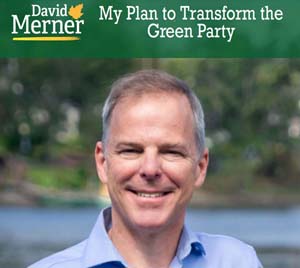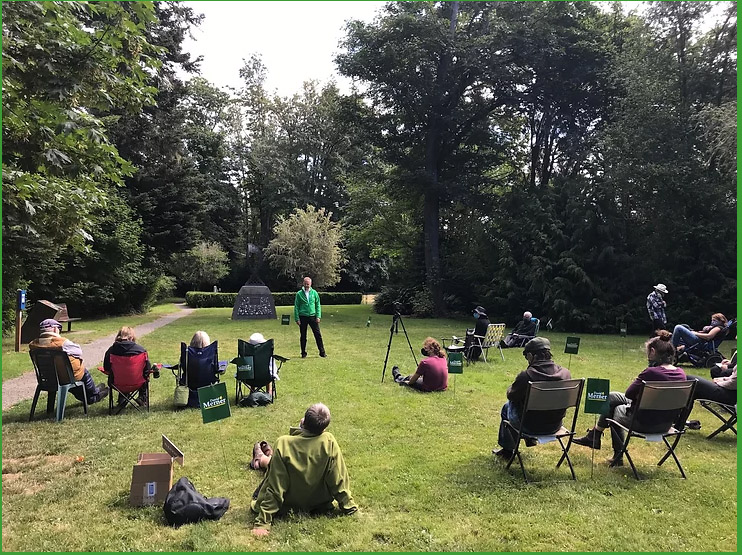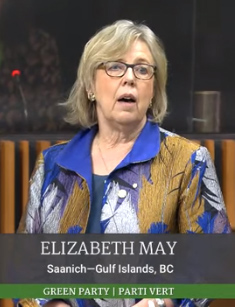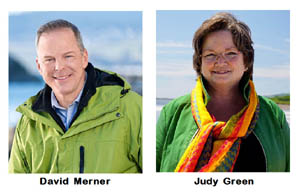
Tuesday September 15, 2020 | SAANICH, BC
by Mary P Brooke, editor | Island Social Trends
During a Zoom-chat with Green Party members today, Green Party leadership candidate David Merner responded to questions about his plan to elect a strong Green caucus to parliament. Media were invited onto the call.
As part of making the Green Party “more competitive and effective” as a political party, Merner emphasized the need to fund and train the local electoral district associations in all 338 ridings.
With that strategy — as outlined in his Plan to Transform the Green Party, he feels the Greens will be able to elect 20 to 30 Members of Parliament, which would be a strong force in the House of Commons for their party policies to gain ground.
Green policies & approaches:
The Greens stand for not only dealing with climate change but also simply effective management of major challenges of the country which Merner identifies as management of the pandemic and economic recovery in directions that includes the benefits of alternative energy sources.
Merner also said today that women as candidates and candidates representing the diversity of Canada are not only welcome but sought out for running as Green candidates. This will help the Greens “be seen by Canadians as a credible choice”, Merner said in responding to a Green member’s question on the Zoom call.
Merner says all 338 riding associations need to be adequately funded, so that when a candidate is brought on stream things can get rolling with their campaign right away.
Effective campaigning:

Campaigning during the COVID-19 pandemic off course includes physical distancing, and Merner says he’s a big fan of local meetings being held outdoors. He’s done a lot of that this year, across the country twice.
Despite the remarkable impact of founding leader Elizabeth May in seeing that Greens have become part of the House of Commons landscape, there are presently only three Green MPs.
“If Canadians don’t hear from us, they won’t vote for us,” says Merner, as part of explaining the approach to creating a ‘Green Wave’ in the next federal election.
Effective organization:
Merner sees power in numbers now, and he proposes to share power with Green Party members and their riding associations, as stated in his news release today:
i) Establishing Electoral District Associations in every riding;
ii) Sharing revenue with riding associations so local campaigns can be properly funded;
iii) Professionally training riding associations and campaign teams;
iv) Running a truly national campaign that supports all candidates;
v) Remaining true to ourselves and to Green Party core values.
“Our candidates must be properly funded in order to compete. My plan ensures they will have the support they need to be successful at the polls on election day. To do this, we must do it together,” Merner said. He cited $20,000 per riding association as the minimum for operating an effective campaign. Basic training includes how to have money in the bank for campaign expenses and how to develop a phone bank.
Becoming a competitive force:
To build the Green Party of Canada to becoming an effective competitive force, Merner says there would be Electoral District Associations (EDAs) in every riding. He feels that once provincial and regional councils develop policy that it should be communicated regionally to virtual party offices in every province and territory.
Merner feels that by sharing revenue between EDAs and the Green Party office in Ottawa that more organizational stability will be achieved.
He sees having a leadership contest every eight years, and leadership reviews every two years.
Beyond the footsteps of Elizabeth May:

Founding leader Elizabeth May served for 13 years (2006-2019) as party leader, and she is still the MP for Saanich-Gulf Islands. She is now 66 years old, recently married, and looking to slow down a bit.
Making a local, national and international career as an environmental activist, author, lawyer and political leader she has notably carved herself a place in Canadian political history. She has received the Order of Canada (2005) and named by the United Nations as one of the leading women environmentalists worldwide. Her fellow MPs named her as Parliamentarian of the Year in 2012.
As so much of the Green Party has been coloured by its founder, it seems only natural that new leadership contenders seek to adjust things that might work better.
There are presently eight candidates for the GPC leadership race (started with 10, then was down to nine until Judy Green in Atlantic Canada recently threw her weight behind Merner).
Political approach:
He also made clear in his comments today that he feels the Liberals say one thing and do another. He used oil industry subsidies as one example. He also feels the federal Liberal government is not taking effective leadership with the opioid crisis; decriminalizing individual possession (something as advised by public health officials) would be a start.

Mener says he is in favour of “co-leadership”, saying it is used successfully in Europe. He is a long-time proponent of proportional representation and ranked ballots in elections.
Today’s Zoom call was hosted by Judy Green. The call followed a format that has become the mainstay of political campaigns during the pandemic — taking questions from members in a way that allows the candidate to cover the various planks of the campaign.



